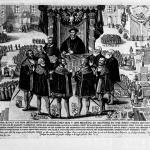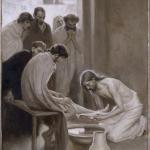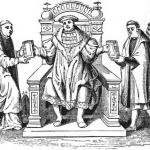 This is an age of the world when nations are trembling and convulsed. A mighty influence is abroad, surging and heaving the world, as with an earthquake. And is America safe? Every nation that carries in its bosom great and un-redressed injustice has in it the elements of this last convulsion.
This is an age of the world when nations are trembling and convulsed. A mighty influence is abroad, surging and heaving the world, as with an earthquake. And is America safe? Every nation that carries in its bosom great and un-redressed injustice has in it the elements of this last convulsion.
As I was reading these lines from the final page of Uncle Tom’s Cabin, I couldn’t help thinking of the current rumbling earthquake in our country. Though not yet with physical violence—or not much so far—we seem to be experiencing a sort of civil war.
Or, more accurately, an uncivil war.
This isn’t why I pulled Uncle Tom’s Cabin off my shelf and began re-reading the yellowed pages of my 1981 paperback edition. I’ve been interrogating the hundreds of books on my shelves: am I going to read you again, or am I going to throw you out, or pass you on to my church’s second-hand sale?
I hadn’t read Stowe’s 1852 masterpiece for decades, so figured it was time to give it another try. Though sometimes sentimental or melodramatic, it does hold up: it paints a multi-faceted picture of the various forms of evil that the institution of slavery took.
It’s commonplace (though true) to say that our country is still living with the after-shocks of this evil. How many of the people who voted for Donald Trump did so in the spirit of backlash of having to live for eight years under a Black president? Of course, people’s motivations for voting are too complex to single out one factor.
Yet in campaigning, Trump did play the racist card. And so far, as President, he has slapped much of the deck onto the table: Mexicans, Muslims with non-European ethnicity, Native Americans who are resisting the construction of the Dakota Access Pipeline.
Harriet Beecher Stowe goes on, following the quote I began with:
O Church of Christ, read the signs of the times! Is not this power the spirit of Him whose kingdom is yet to come, and whose will to be done on earth as it is in heaven?
But who may abide the day of his appearing? “For that day shall burn as an oven: and he shall appear as a swift witness against those that oppress the hireling in his wages, the widow and the fatherless, and that turn aside the stranger in his right and he shall break in pieces the oppressor.”
I’m fascinated by her including and even italicizing the castigation of those who “turn aside the stranger in his right.” The stranger plays a very small part in Uncle Tom’s Cabin: maybe Stowe has in mind the runaway slaves who seek mercy from the white people they flee to.
But turning aside the stranger was one of the first executive orders of our current president. O Church of Christ, read the signs of the times! Stowe’s language here is apocalyptic. But many of us are eager to see this oppressor broken down before the end time.
We don’t seek violence to redress the violence of his words and actions; we don’t seek to literally break him in pieces. But we flood the streets with our protest signs, and we call and visit our Congressional representatives with the goal of shattering those of his policies that we see as, frankly, evil. Evil because they harm the least among us.
“Are not these dread words for a nation bearing in her bosom so mighty an injustice?” So Stowe concludes the passage above.
In our times, at this moment, the injustice is encapsulated in the person who happens to be the President. I don’t pray for his eternal damnation; I leave that judgment to God. But I’d sure like to see him (in his own Tweeted word) “unpresidented.”
Not that getting rid of this President would rid our country of the systemic evils of racism, xenophobia, militarism, heartless capitalism, etc. All of his cabinet appointees concur with him in this agenda. And half of the country’s population still supports the President; that is, half the country is not uncomfortable with what I’m naming as systemic evils.
Are we moving toward a truly violent Civil War such as the one that broke out less than a decade after Harriet Beecher Stowe published her book?
Or can we have the hope that Stowe expresses in her Preface to Uncle Tom’s Cabin? She writes that despite the evils of slavery:
Another and better day is dawning; every influence of literature, of poetry, and of art, in our times, is becoming more and more in unison with the great master chord of Christianity, “good-will to man.”
Peggy Rosenthal is director of Poetry Retreats and writes widely on poetry as a spiritual resource. Her books include Praying through Poetry: Hope for Violent Times (Franciscan Media), and The Poets’ Jesus (Oxford). See Amazon for a full list. She also teaches an online course, “Poetry as a Spiritual Practice,” through Image’s Glen Online program.
Above image by Mark Steinhoff, used with permission under a Creative Commons License.

















